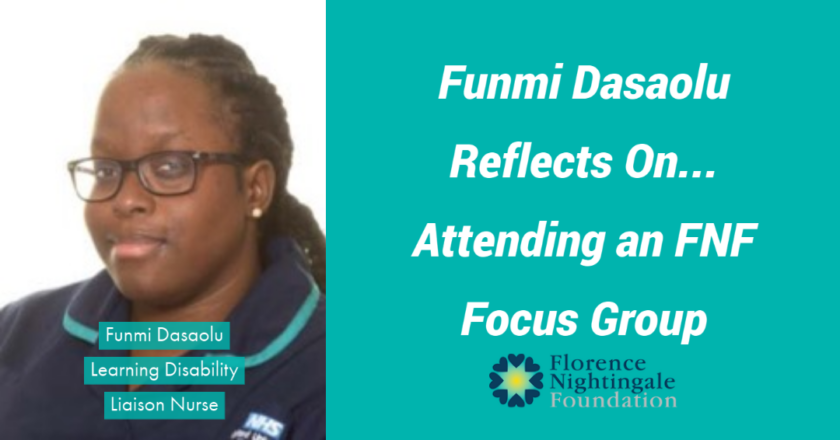
In October 2020, the Florence Nightingale Foundation invited Alumni members to take part in a series of focused discussions to explore how learning Disability Nurses had adapted to the changes during the first wave of the COVID-19 pandemic. Funmi Dasaolu is a Learning Disability Liaison Nurse, and one of our Alumna members. Funmi took part in one of the virtual focus groups. Here is her account of what the experience was like:
Upon receiving the invitation asking for participants for a focus group exploring the contributions and experiences of learning disability nurses during the covid-19 pandemic, I was hesitant to participate. My initial thoughts were, I am not sure I have much to contribute having switched to solely working from home at the beginning of the pandemic. Nevertheless, in discussion and with encouragement from my line manager, I expressed an interest and subsequently attended the focus group.
I went into the discussions with an open mind, and no real expectations or with any particular agenda. Several virtual discussions took place, over the latter part of 2020, and involved a total of 26 participants. These discussions occurred as part of research undertaken by the Florence Nightingale Foundation, which was later published in the Learning Disability Practice journal via the RCNi.
Discussions covered a wide breadth of topics and issues encountered as a result of the pandemic, as well as provided a space to collectively reflect and pause. In doing so, also enable identification of good practice, and positive changes implemented by individual practitioners and teams. I was joined by colleagues from a range of clinical areas across different parts of the country. Discussions were facilitated, with specific questions and prompts; but allowed all participants the time and space to freely contribute as desired.
I found the experience to be very positive; learning disability nursing is a branch of nursing that is not as widely recognised compared with other branches of nursing. There is limited awareness of the profession, and the needs of individuals with learning disabilities by the general public. Over recent years, those within the profession have seen dwindling numbers of new applicants, and like the other branches of nursing, learning disabilities also face the same issues with retention and recruitment. This is despite the growing complexities of managing the healthcare needs of individuals with learning disability, particularly as individuals are living longer as a result of enhancements in medicine and medical technologies.
As a learning disability nurse, outside your immediate day-to-day work; it is rare to have the opportunity to meet with other learning disability nurses working in different clinical environments. This is especially true for individuals who work in acute hospital settings, where general adult nurses are the majority. In view of this, it was such a pleasant experience to be able to interact and discuss clinical issues with other learning disability nurses working in a range of diverse clinical and geographical settings.
This provided an opportunity to be able to collectively “take stock”, pause, reflect, and share learning. We were able to learn from each other, particularly with respect to dealing with some of the challenges arising from the pandemic. We were also able to celebrate the too often overlooked and seemingly insignificant wins. The victories we discussed ranged from successfully supporting an individual during their COVID-19 admission, to minimising the isolation experienced by individuals as a result of the national lockdown, to successfully changing service delivery to meet the increase in demand due to the virus.
Personally, I found the experience to be very insightful, hearing how different services across the UK had adapted their service to ensure the needs of individuals with learning disabilities were continually met. I learnt to value my work and contribution. Having been working remotely, I felt as if my contributions were not significant. I had not been one of those nurses “working on the front line”, however, in taking part; I came to realise even though I am at home, I can still make a difference. I left with a sense of pride and achievement.
It was a validating experience; it was evident how we all adapted, were inventive and creative. I left discussions feeling energised, motivated, and enthusiastic. It was helpful to be able to collaborate, acknowledge the difficulty, the pressure, the uncertainty, and the positive changes that we as a team of professionals in our different services have implemented to ensure continuity of service delivery, and that ultimately people with a learning disability receive right care at the right time.
Thank you to the Florence Nightingale Foundation for shining a light on the profession and the work undertaken by learning disability nurses across the country.